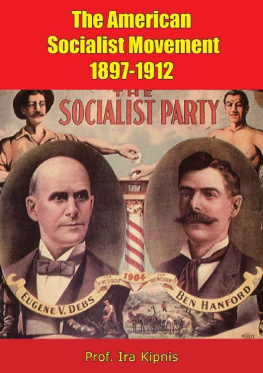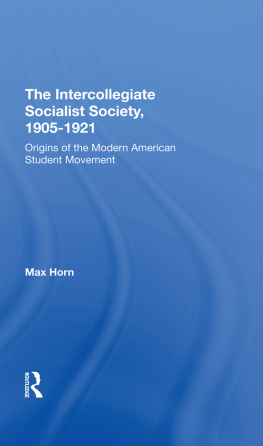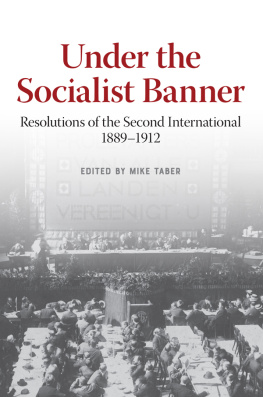Ira Kipnis - The American Socialist Movement 1897-1912
Here you can read online Ira Kipnis - The American Socialist Movement 1897-1912 full text of the book (entire story) in english for free. Download pdf and epub, get meaning, cover and reviews about this ebook. year: 2005, publisher: Haymarket Books, genre: Politics. Description of the work, (preface) as well as reviews are available. Best literature library LitArk.com created for fans of good reading and offers a wide selection of genres:
Romance novel
Science fiction
Adventure
Detective
Science
History
Home and family
Prose
Art
Politics
Computer
Non-fiction
Religion
Business
Children
Humor
Choose a favorite category and find really read worthwhile books. Enjoy immersion in the world of imagination, feel the emotions of the characters or learn something new for yourself, make an fascinating discovery.
- Book:The American Socialist Movement 1897-1912
- Author:
- Publisher:Haymarket Books
- Genre:
- Year:2005
- Rating:3 / 5
- Favourites:Add to favourites
- Your mark:
- 60
- 1
- 2
- 3
- 4
- 5
The American Socialist Movement 1897-1912: summary, description and annotation
We offer to read an annotation, description, summary or preface (depends on what the author of the book "The American Socialist Movement 1897-1912" wrote himself). If you haven't found the necessary information about the book — write in the comments, we will try to find it.
This is the epic story of the struggle to build a mass socialist movement in ragtime America. Kipnis was a brilliant historian, and this is his enduring gift to activists. Mike Davis
A new edition of the out-of-print classic.
The American Socialist Movement 1897-1912 — read online for free the complete book (whole text) full work
Below is the text of the book, divided by pages. System saving the place of the last page read, allows you to conveniently read the book "The American Socialist Movement 1897-1912" online for free, without having to search again every time where you left off. Put a bookmark, and you can go to the page where you finished reading at any time.
Font size:
Interval:
Bookmark:

This edition is published by Papamoa Press www.pp-publishing.com
To join our mailing list for new titles or for issues with our books papamoapress@gmail.com
Or on Facebook
Text originally published in 1952 under the same title.
Papamoa Press 2018, all rights reserved. No part of this publication may be reproduced, stored in a retrieval system or transmitted by any means, electrical, mechanical or otherwise without the written permission of the copyright holder.
Publishers Note
Although in most cases we have retained the Authors original spelling and grammar to authentically reproduce the work of the Author and the original intent of such material, some additional notes and clarifications have been added for the modern readers benefit.
We have also made every effort to include all maps and illustrations of the original edition the limitations of formatting do not allow of including larger maps, we will upload as many of these maps as possible.
The American Socialist Movement 18971912
by
IRA KIPNIS
Contents
for Jake
THE CONTRIBUTIONS made by ones associates during the long process which finally culminates in the publication of a book can perhaps be acknowledged only in generalizations. However, the usual thanks would not begin to express my gratitude for the considerable and generous assistance of professors Bessie Louise Pierce, Kermit Eby, and Walter Johnson, all of the University of Chicago. Professor Pierces detailed criticism of the first five chapters did much to alter, and, I hope, improve the remainder of the work. Professor Eby read the entire manuscript, and his experience and concern with the problem of factionalism were invaluable. To Walter Johnson should go much of the credit for whatever worth this study may have. He first called my attention to the need for an investigation of the role of the Socialist Party during the era of the Progressive Movement, and throughout the period of research and writing gave generously of his time, knowledge, and penetrating interest in all phases of historical inquiry. Unfortunately, there is a limit to the aid which even the most able and liberal scholars can provide. For such shortcomings as this study reveals, therefore, I alone am responsible.
IRA KIPNIS
February 21, 1952.
AMERICAN CAPITALISM has been praised for many virtues. Its supporters have credited the unrestricted operation of the free enterprise system with extending the national boundaries from coast to coast, developing an enormous productive plant, rewarding the industrious, encouraging the poor, bringing prosperity to all, and providing the only environment for a society dedicated to freedom, democracy, and social justice.
Yet, throughout our history many Americans have found that what was praised in theory did not work in practice. Negro slaves, indentured servants, debt-ridden farmers, propertyless workers, ambitious professionals, and hard-pressed businessmen have all concluded at one time or another that society would benefit from some more or less basic changes in the operation of the American economy. Comparatively few ever went so far as to suggest that capitalism itself be eliminated. But many held that if they were to have the opportunities assumed to be available to all under a competitive system, the activities of those who had clawed their way to positions of economic power would have to be regulated and restricted.
Most American reformers have continued to seek ways to compel the free enterprise system to operate equitably. But the hardships and dislocations caused by the impact of industrial capitalism on Americas relatively egalitarian agrarian society caused the ideology of European utopian socialism to be greeted with considerable enthusiasm before the Civil War. The new working class of the 1820s was discovering that the Declaration of Independence needed restating to meet the problems created by industrial capitalism.
Co-operative colonies were not the only utopian solutions attempted by dissatisfied members of society. Producers and consumers co-operatives flourished sporadically for over forty years as utopian alternatives to the production and distribution relations of capitalism. With every new industrial crisis, with every failure of the trade unions to alter materially the conditions of labor and the standard of living in pre-and post-Civil War America, farmers and workers turned anew to co-operatives as a way to beat the capitalists at their own game. While some co-operatives were successful for short periods, none succeeded in freeing its members from the web of capitalist wages, prices, and depressions.
The utopian socialists did their best to point up the need for drastic remedies in an industrial society which they accused of causing the creator of wealth to lose more and more of his just reward. But the building of socialist islands in capitalist oceans did little to enable labor to keep all it produced. The Utopians saw no need to fight for immediate gains within the existing economic system. Therefore, the trade union movement was neglected. Socialism was to be achieved by withdrawing from contact with the evils of society. Therefore, there was no reason to engage in political activity to change that society. Thus, while the Utopians spotlighted the shortcomings of capitalism they actually weakened the day-to-day struggles of the unions and radical political parties. The utopian socialists saw no relation between the development of capitalism, the growth of the working class, the daily class struggle, and the winning of socialism.
Economic and social conditions even before the Civil War had been such as to bring forth proposals for a complete overhauling of the economy. But the domestic conflicts which followed the war made ante-bellum America seem in retrospect a land flowing with milk and honey for all. While production expanded at an unprecedented rate in the thirty-five years following the abolition of slavery, competing small-scale manufacture rapidly gave way to non-competitive giant industrial enterprise. The small manufacturers vision of limitless opportunities for expansion in a slaveless America vanished in the struggle to maintain a precarious business position against increasing monopoly pressure. The farmers hope for endless prosperity inspired by the prospect of free land and adequate transportation disappeared in a flood of mortgages, high freight rates, falling prices, and vanishing frontiers. The workers dream of job security, a rising standard of living, and escape into farming or even business ownership in an expanding economy turned into a nightmare of depressions, wage cuts, and unemployment.
In this atmosphere of ruined hopes and lost fortunes, of jobless workers and factoryless businessmen, of land-poor farmers and farmless laborers, the schemes for alleviating hardship and returning to the more or less imaginary good old days of competition and equality through government intervention were legion. Farmers granges and alliances, producers and consumers co-operatives, antimonopoly, union labor, and Peoples parties all sought to break the trusts tightening stranglehold on the nations economic life. Each in turn disappeared, victim of monopolys tremendous strength, shaky theoretical assumptions, and an inability to unite farmer, worker, and small businessman against the common enemy.
But attempts to return to more competitive conditions or to escape into co-operative colonies or factories were no longer the only alternatives offered those who believed there was too much opportunity for Satan in Americas devil take the hindmost economy. Marxian socialism was first advocated in the United States in the 1850s, and political parties based on the social analysis of Karl Marx and Frederick Engels were organized on a national basis almost immediately following the end of the Civil War. By 1900, Marxian or scientific socialism was the ideology of almost all American movements designed to eliminate the inequities of capitalism by replacing it with socialism. The socialism that inspires hopes and fears today is the school of Marx, wrote Thorstein Yeblen in 1907. No one is seriously apprehensive of any other so-called socialistic movement, and no one is seriously concerned to criticise or refute the doctrines set forth by any other school of socialists.
Next pageFont size:
Interval:
Bookmark:
Similar books «The American Socialist Movement 1897-1912»
Look at similar books to The American Socialist Movement 1897-1912. We have selected literature similar in name and meaning in the hope of providing readers with more options to find new, interesting, not yet read works.
Discussion, reviews of the book The American Socialist Movement 1897-1912 and just readers' own opinions. Leave your comments, write what you think about the work, its meaning or the main characters. Specify what exactly you liked and what you didn't like, and why you think so.









